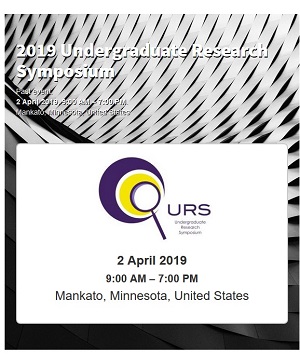Psychosocial Status and Learning Experiences in College Students with Traumatic Brain Injury
Location
CSU Ballroom
Start Date
2-4-2019 2:00 PM
End Date
2-4-2019 3:30 PM
Student's Major
Speech, Hearing, and Rehabilitation Services
Student's College
Allied Health and Nursing
Mentor's Name
Hsinhuei Sheen Chiou
Mentor's Department
Speech, Hearing, and Rehabilitation Services
Mentor's College
Allied Health and Nursing
Description
A Traumatic Brain Injury (TBI) is an injury that disrupts normal brain function. Some symptoms of TBI include headaches, nausea, fatigue, depression, and anxiety. These symptoms may impact ones psychosocial status which relates to the social factors of individual thoughts and behaviors and learning abilities of the individual. The effects of this injury are often not visible to others. The primary goal of this research is to identify how college students with a TBI view their own psychosocial status and the impact it has on their learning experiences.
Eleven college students with a traumatic brain injury diagnosis were recruited and completed a survey to gather their perspectives. We analyzed the demographics and two questions relating to psychosocial status and learning using a 5-point rating scale. All survey responses were on the secured Qualtrics website and used for data analysis. Data was analyzed by the research team using descriptive, quantitative and qualitative statistics.
Results showed that after brain injury, students felt misunderstood, lonely, less respected and less accepted. These feelings correlated with a reduced quality of relationships with friends. In regards to academics, students reported that after injury they had the most difficulty with socializing with other students, achieving success, participating in extracurricular activities, and disclosing or identifying with their brain injury.
Psychosocial Status and Learning Experiences in College Students with Traumatic Brain Injury
CSU Ballroom
A Traumatic Brain Injury (TBI) is an injury that disrupts normal brain function. Some symptoms of TBI include headaches, nausea, fatigue, depression, and anxiety. These symptoms may impact ones psychosocial status which relates to the social factors of individual thoughts and behaviors and learning abilities of the individual. The effects of this injury are often not visible to others. The primary goal of this research is to identify how college students with a TBI view their own psychosocial status and the impact it has on their learning experiences.
Eleven college students with a traumatic brain injury diagnosis were recruited and completed a survey to gather their perspectives. We analyzed the demographics and two questions relating to psychosocial status and learning using a 5-point rating scale. All survey responses were on the secured Qualtrics website and used for data analysis. Data was analyzed by the research team using descriptive, quantitative and qualitative statistics.
Results showed that after brain injury, students felt misunderstood, lonely, less respected and less accepted. These feelings correlated with a reduced quality of relationships with friends. In regards to academics, students reported that after injury they had the most difficulty with socializing with other students, achieving success, participating in extracurricular activities, and disclosing or identifying with their brain injury.
Recommended Citation
Hoban, Bridget; Koryn Greskowia; and Emma Gale. "Psychosocial Status and Learning Experiences in College Students with Traumatic Brain Injury." Undergraduate Research Symposium, Mankato, MN, April 2, 2019.
https://cornerstone.lib.mnsu.edu/urs/2019/poster-session-B/30




